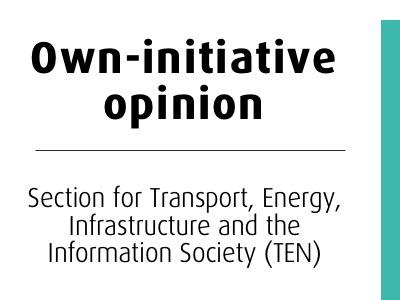European Economic
and Social Committee
The role of services of general interest (SGI) for competitiveness, social cohesion and democracy in the European Union
Background
This own-initiative opinion highlights the crucial role of services of general interest (SGI) in the European single market and a socially, green and economically sustainable EU. Well-financed and high-quality SGIs are fundamental for social cohesion, economic competitiveness and a more sustainable EU and play a key role in strengthening the economy.
SGIs significantly contribute to value creation, employment and investment, enhancing the EU’s resilience in crises such as the COVID-19 and the energy crisis. In 2021, SGIs and services of general economic interest (SGEIs) generated EUR 3,721 billion in value creation representing 28.4% of the EU total.
SGEIs hold untapped potential, particularly in investment and EU strategic autonomy. Key sectors such as energy, health and security are vital for green and digital transitions and social cohesion.
Access to quality SGI is essential for citizens and democracy. Many people experience inadequate services, especially vulnerable users facing financial or mobility barriers. Rising costs and two-tier systems (fast paid services vs. slow free services) deepen inequality, eroding trust in democracy and fuelling populism. Only 54% of EU citizens rate public services positively, with large disparities across Member States.
Key points
The EESC:
- calls for a holistic approach towards services of general interest policies (SGIs), as opposed to the current sectoral approach of EU policies, recognising the central role of modern SGIs in promoting sustainable prosperity and competitiveness. In this spirit, the EESC calls on the Commission to take action with concrete follow-up to the Letta report in the form of an SGI action plan;
- calls on the Member States to secure universal and equal access to affordable, high-quality basic services. This is a matter of social justice, since SGIs are delivered at a price that does not depend on the purchasing power of users;
- states that countries with an infrastructure investment policy and correctly funded servicing costs for quality public services enable their citizens and enterprises to spend less on ‘living/operating’ costs. The EESC therefore argues that it is necessary to properly fund and improve SGIs and to align them more closely with citizens’ needs in order to improve satisfaction and trust in democracy;
- underlines that a regional balance must be ensured when deploying investment in public services. In this sense, public investment, particularly in connection with the Cohesion Fund, deserves special consideration in the implementation of fiscal rules, reflecting their contribution to long-term convergence and resilience.
Additional information
Section: Transport, Energy, Infrastructure and the Information Society (TEN)
Opinion number: TEN/851
Opinion type: Own-initiative
Rapporteur: Thomas Kattnig (Group II - Austria)
Date of adoption by section: 24 June 2025
Result of the vote: 57 in favour, 0 against, 0 abstentions
Date of adoption in plenary: 16-17 July 2025
Result of the vote: 175 in favour, 3 against, 12 abstentions
Contact
Marco Pezzani
Press Officer
Tel.: +32 2 546 9793 | Mob: +32 470 881 903
E-mail: marco.pezzani@eesc.europa.eu
Aleksandra Sarman Grilc
Administrator
Tel.: +32 546 8333
